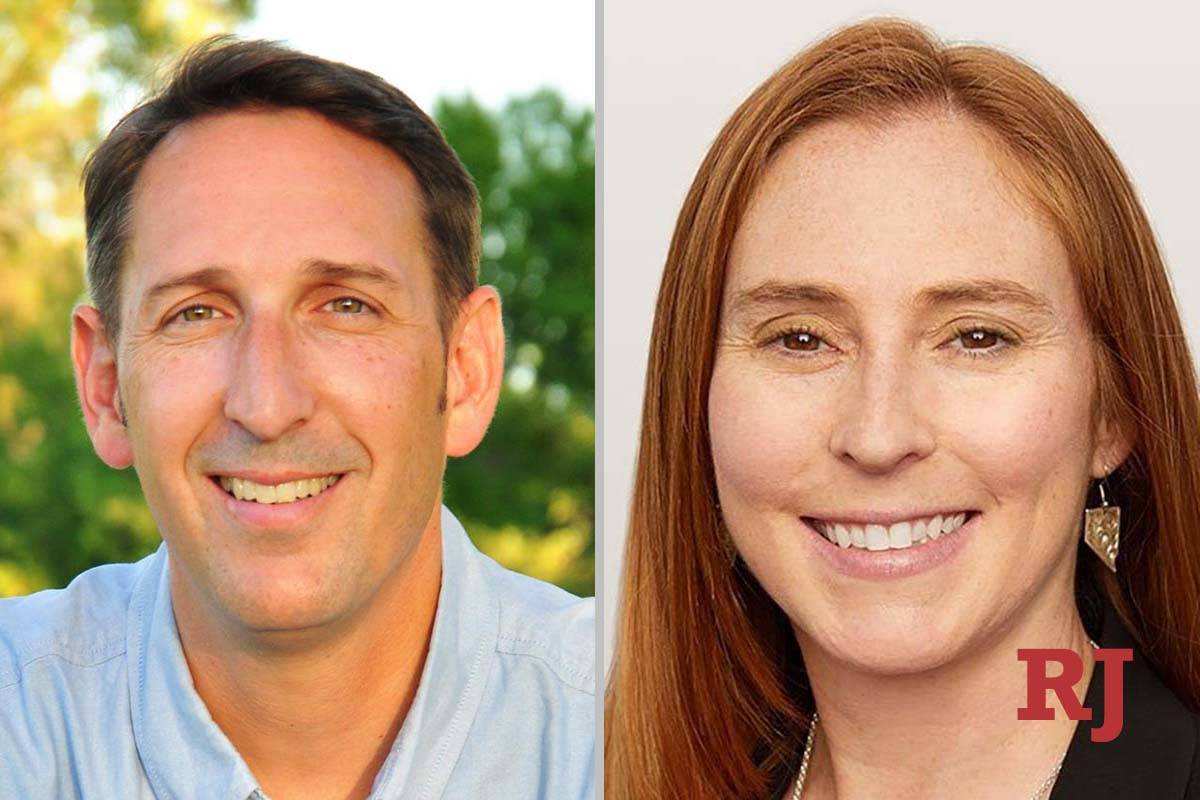Hammond draws challenge from Becker in Senate District 18
The race in Senate District 18, covering the northwest Las Vegas Valley, sees incumbent Republican Scott Hammond seeking his third four-year term against Democrat Liz Becker in her first bid for elected office.
Both candidates have teaching in their backgrounds and bring detailed views on education to the race.
Energized by the 2016 elections, Becker, who turned to environmental science after starting out as a teacher, left her job at Southern Nevada Water Authority last year to focus full time on running for office representing the district where she’s lived for 15 years.
Hammond taught in Clark County schools and later was a founding member of a Las Vegas charter school where his wife teaches. He served one two-year term in the Assembly before winning election to the Senate in 2012 and re-election in 2016.
Becker, a strong supporter of public school education, said her third-grade daughter is attending school from home due under the COVID-induced hybrid education plan. But she acknowledges that’s not an option for many households where both parents might be working full time.
“I agree that schools shouldn’t be open full, because there’s too many teachers who are at risk and who are worried, and I think it does increase the probability that we’ll have more community spread if the schools are fully open,” she said. “But I do like parents to have choices, because just going all virtual, and then not knowing who’s going to be home with your child or how someone can help your child if you can’t, that is going to make the disparities in the system greater.”
Hammond’s emphasis in education is “really about trying to develop opportunities for students to find their niche in the academic world. I don’t care if it’s K-12, or higher education, I think we need to make sure that kids have choices on where they go to school.” He left teaching full time in 2015 and now works for the Nevada Contractors Association in workforce development.
Hammond said he thinks the revised school funding formula passed in 2019 will need to be revisited next session. Its phased-in implementation was designed to provide a year to assess its likely impact before it went into effect. The coronavirus impact on school operations this year could render that assessment unusable, he said.
Mining tax changes
Reviewing the summer’s legislative special sessions, Becker said she backed the voting and ballot changes Democrats passed over Republican objections, mostly on expanded mail-in voting. She said she was “not happy” with the unsuccessful push by Democrats to revise how the mining industry is taxed by the state. The measure fell one vote short of passage in the Senate due to Republican opposition.
“That was not a tax increase. It was simply telling mining they couldn’t take the deductions as much as they’d been taking them,” she said. “There are zero mines in Senate District 18 but there are 38 schools. And I think that people who live in District 18 would have supported taking those deductions away if it meant that all of that money would go into education.”
In the end, a series of resolutions passed, one of which, if approved by voters, would take the mining tax question out of the state Constitution and let lawmakers regulate it on an ongoing basis. Hammond said he had supported the 2014 ballot initiative that would have done the same thing but objected to another Democrat-sponsored resolution that would simply cut out deductions mining companies can claim and raise the tax on them
“Nobody does that, unless of course, you’re really trying to hurt the mining industry,” he said.
Dealing with coronavirus
Becker said she supported changes enacted to let courts to stay evictions and refer the proceedings to mediation. Hammond was one of three Republicans who voted against it. Both supported a measure designed to expedite unemployment insurance claims processing.
Hammond said there was “absolutely a need” for the first special session, which dealt with the pandemic’s direct impact on state finances, though he said he was “worried” by the move to tap all of the state’s $400 million surplus to offset declining revenues.
As for the second session, aside from the approved unemployment division changes and COVID-19 liability protections for businesses, Hammond called it “just a Christmas gift to the Democrats.” He had objected to removing hospitals and schools from the liability protections
“There was no reason whatsoever to take hospitals out of that bill and protect those people coming in to visit their loved ones and/or vendors who might be there to provide services to the hospital,” he said. Removing schools, he said, meant they couldn’t fully open.
Republicans hold a 3,500 vote advantage over Democrats in the district, a four percentage point difference, 38-34. Nonpartisan voters represent 22 percent of the active voter roll.
Contact Capital Bureau reporter Bill Dentzer at bdentzer@reviewjournal.com. Follow @DentzerNews on Twitter.


















